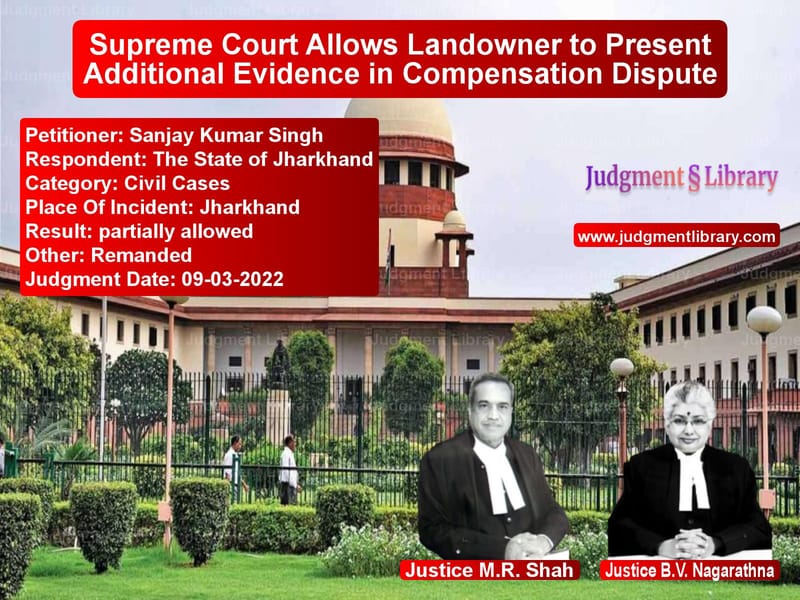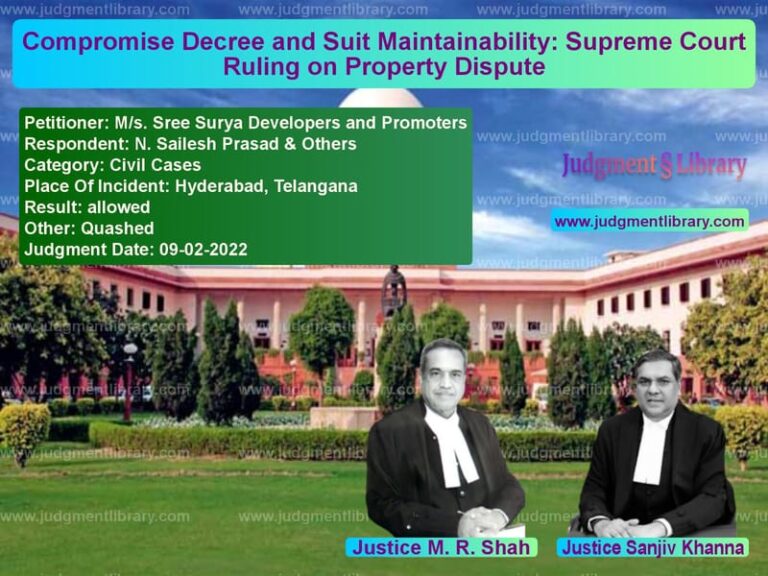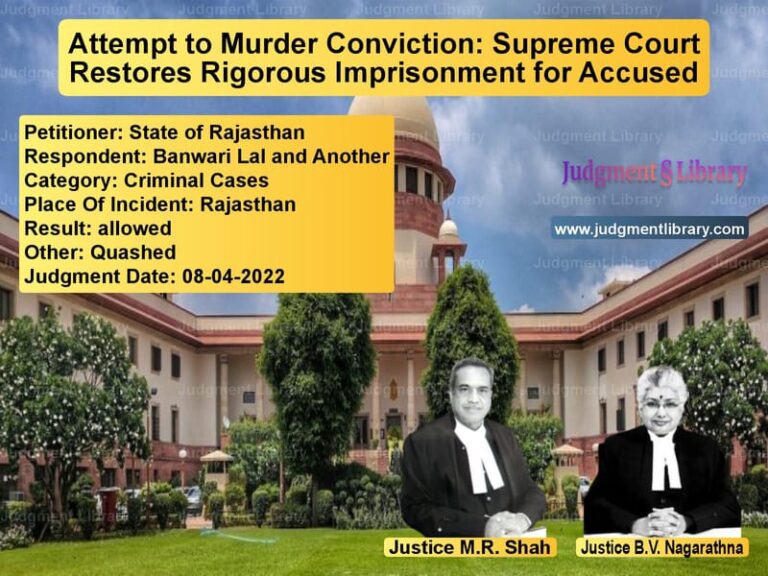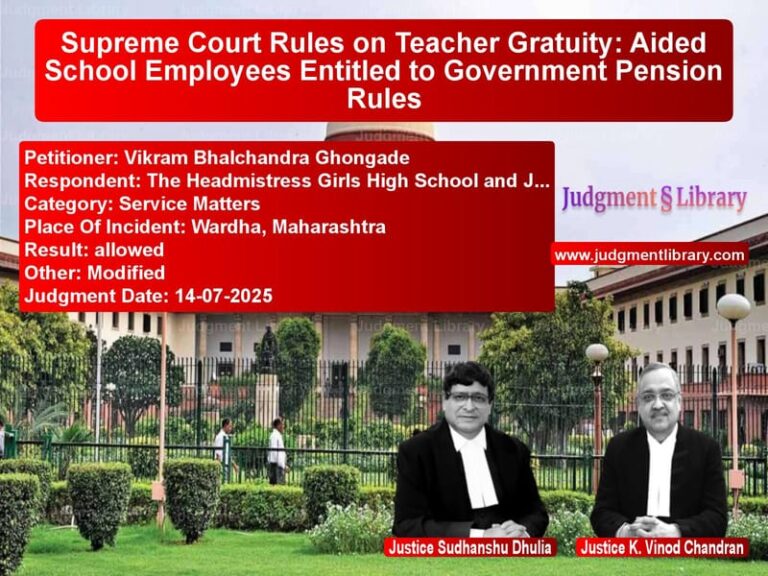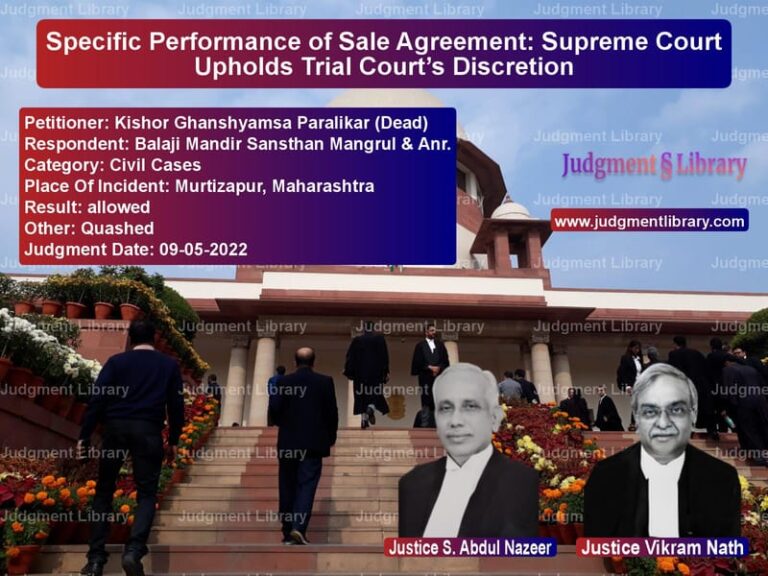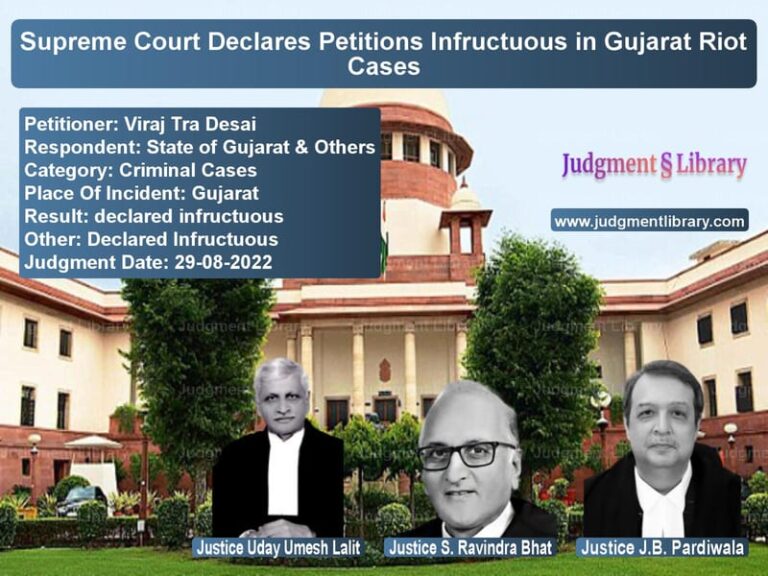Supreme Court Allows Landowner to Present Additional Evidence in Compensation Dispute
The Supreme Court recently ruled in the case of Sanjay Kumar Singh vs. The State of Jharkhand, addressing a dispute over land compensation under the Land Acquisition Act, 1894. The case revolved around whether a landowner could introduce additional evidence at the appellate stage to prove the fair market value of acquired land. The Court ruled in favor of the appellant, allowing additional evidence and remanding the matter for fresh determination.
This judgment is significant as it clarifies the application of Order 41 Rule 27 of the Code of Civil Procedure (CPC) in cases where the introduction of new evidence is crucial for delivering fair compensation to landowners.
Background of the Case
The dispute arose when the State of Jharkhand acquired land belonging to the appellant, Sanjay Kumar Singh, through a notification issued under Section 4 of the Land Acquisition Act, 1894, dated October 1, 1980. The Land Acquisition Officer determined a compensation amount of Rs. 92,121/- for the acquired land. The appellant sought a higher compensation by filing a reference under Section 18 of the Act, which was rejected by the Reference Court.
Feeling aggrieved by the Reference Court’s decision, the appellant filed First Appeal No. 44/2007 before the High Court of Jharkhand. In the appeal, he also submitted an application under Order 41 Rule 27 CPC (IA No. 1384/2019), seeking to introduce additional evidence, including sale deeds and certified copies of judgments from similar land acquisition cases.
The High Court dismissed both the appeal and the application for additional evidence, prompting the appellant to challenge the decision before the Supreme Court.
Legal Issues Considered
- Whether the High Court erred in dismissing the application for additional evidence under Order 41 Rule 27 CPC.
- Whether the additional evidence was necessary for determining the fair market value of the acquired land.
- The applicability of judicial precedents on allowing new evidence at the appellate stage.
Petitioner’s Arguments (Sanjay Kumar Singh)
- The Reference Court had rejected the only sale deed available as evidence, leaving no basis for determining the fair market value.
- The additional evidence sought to be introduced was crucial for establishing the correct market price of the land.
- The High Court should have considered that the appellant had no prior opportunity to present the additional evidence due to procedural limitations.
- As per precedents, appellate courts have the discretion to allow additional evidence if it is necessary for justice.
Respondent’s Arguments (State of Jharkhand)
- The appellant failed to demonstrate due diligence in producing the additional evidence before the Reference Court.
- Under Order 41 Rule 27 CPC, additional evidence should only be allowed in exceptional cases.
- The High Court correctly found that the application for additional evidence did not satisfy legal requirements.
Supreme Court’s Judgment
The Supreme Court bench, comprising Justices M.R. Shah and B.V. Nagarathna, ruled in favor of the appellant and set aside the High Court’s order.
1. High Court Failed to Consider Relevance of Additional Evidence
“The High Court, while rejecting the application, did not appreciate that the documents sought to be introduced might have a direct bearing on determining the fair market value of the acquired land.”
The Supreme Court emphasized that the absence of proper evidence left the landowner without a fair chance to claim appropriate compensation.
2. Order 41 Rule 27 CPC Allows Additional Evidence in Exceptional Cases
“The admissibility of additional evidence does not solely depend upon whether the applicant had an earlier opportunity to present it, but on whether the appellate court requires such evidence for delivering a just verdict.”
The Court reaffirmed that appellate courts can allow additional evidence if it serves the interests of justice.
3. Landowners Are Entitled to Fair Market Value
“A claimant whose land is acquired for public purpose must receive fair compensation, and procedural technicalities should not deprive them of this right.”
The Court stressed that compensation determination should be based on all relevant materials.
4. Case Remanded for Fresh Determination
“The matter is remanded to the Reference Court, which shall consider the additional evidence and determine the fair market value afresh.”
The Supreme Court directed the lower court to reassess the compensation after considering the newly admitted evidence.
Key Takeaways from the Judgment
- The Supreme Court reaffirmed that courts must prioritize justice over procedural technicalities in land acquisition cases.
- Order 41 Rule 27 CPC allows additional evidence when it directly impacts case outcomes.
- Fair compensation is a fundamental right of landowners under the Land Acquisition Act.
- High Courts must exercise discretion judiciously when rejecting additional evidence applications.
Implications of the Verdict
This ruling has significant implications for land acquisition law and compensation disputes:
- Landowners can present additional evidence in appeals if it is crucial for fair compensation.
- Appellate courts must ensure that procedural barriers do not lead to unjust outcomes.
- The judgment reinforces the principle that compensation should reflect the actual market value of acquired land.
Overall, this Supreme Court ruling safeguards landowners’ rights and ensures that compensation disputes are decided with proper evidence, promoting fairness in land acquisition proceedings.
Petitioner Name: Sanjay Kumar Singh.Respondent Name: The State of Jharkhand.Judgment By: Justice M.R. Shah, Justice B.V. Nagarathna.Place Of Incident: Jharkhand.Judgment Date: 09-03-2022.
Don’t miss out on the full details! Download the complete judgment in PDF format below and gain valuable insights instantly!
Download Judgment: sanjay-kumar-singh-vs-the-state-of-jharkha-supreme-court-of-india-judgment-dated-09-03-2022.pdf
Directly Download Judgment: Directly download this Judgment
See all petitions in Property Disputes
See all petitions in Damages and Compensation
See all petitions in Landlord-Tenant Disputes
See all petitions in Judgment by Mukeshkumar Rasikbhai Shah
See all petitions in Judgment by B.V. Nagarathna
See all petitions in partially allowed
See all petitions in Remanded
See all petitions in supreme court of India judgments March 2022
See all petitions in 2022 judgments
See all posts in Civil Cases Category
See all allowed petitions in Civil Cases Category
See all Dismissed petitions in Civil Cases Category
See all partially allowed petitions in Civil Cases Category

